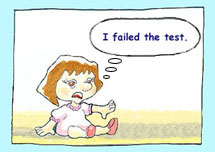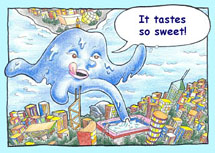Grammar: Sentence: Quoting and reporting speech and thoughts
| Reporting speech and thoughts |
Tense in indirect speech
The choice of tense in indirect speech is quite complex, and depends primarily on whether the verb is in the reporting clause or the reported clause, and whether the tense should be the same for both clauses or not. There are no simple rules for 'changing' direct speech into indirect speech.
Tense in reporting clause
The reporting verb in an indirect speech structure (say, speak, tell, ask, explain, complain) is usually in the past tense form since indirect speech is typically used to report what people said, wrote or thought at some point in the past:
| MegaMonster complained that the water was polluted. |
 |
| Kitty thought she had failed her test. |
 |
Although all tenses are possible for the reporting verb, we commonly use the past simple or present simple. Note that the present simple is usually only used in certain situations:
| to report a general statement | ||
| Most people believe // that smoking is bad for your health. | ||
| to report something that people say habitually | ||
| Hong Kong people always say // that you shouldn't drink tap water. | ||
| to report something that has current relevance | ||
| The black rain signal tells us // that we can expect floods and landslides today. | ||
| to report the content of a book, novel, film, play, academic study, etc | ||
| Ricky's old geography book shows // that Hong Kong once belonged to Britain. | ||
Tense in reported clause
The tense of the reported clause is generally one step further in the past than the reporting clause. For example, if the reporting clause is in the simple past tense, the reported clause will usually be in the past perfect tense, as in the example above: Kitty thought that she had failed her test. However, it could just as easily stay in the same tense:
| MegaMonster said simple past that the water from the pool tasted
sweet. |
 |
The reasons for a particular choice of tense are found in the context of the reporting clause, and are often not easily discerned.
In principle the same shift to a greater past occurs when the verb in the report clause expresses modality instead of tense. For example, if the MischiefMaker had said to MegaMonster "The water from the pool will taste sweet", then a report of this is likely to move the modal auxiliary verb to its 'past' form:
The MischiefMaker said // that the water from the pool would be sweet.
past tense 'past' modal
Here is a summary of the relationship between the tenses in the reporting clause and those in the report clause:
| Tense & modality | |
| direct speech | indirect speech |
|
tense |
|
| present simple Kitty says, "Barney is hungry." |
past simple Kitty said that Barney was hungry. |
| past simple Kitty says, "Barney was naughty." |
past perfect Kitty said that Barney had been naughty. |
| future Kitty says, "Barney will come home." |
future perfect Kitty said that Barney would come home. |
|
modality |
|
| Kitty says, "Barney may be sad." | Kitty said that Barney might be sad. |
| For information about some of the misconceptions that people often have about tense in indirect speech, click here. |  |
|
Alternative terms |
|
| PrimeGram | Other grammars |
| quoting | direct speech |
| reporting | indirect speech |
Tell me more ... Structure of indirect speech |
|
||
To give us feedback about this section, click here or on the Comment button at the top of the screen.
If you have any questions about this section, visit the Language Corner.
If you have any questions or suggestions about how to teach this section, send a message to the Teaching Corner.